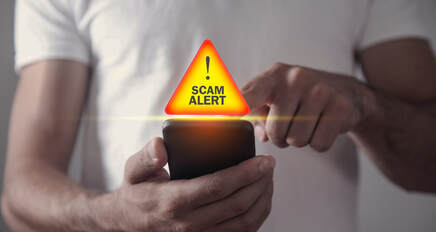 Unfortunately, there will always be scam artists out there. These people are looking to make a few bucks, sometimes much more, on trusting and unsuspecting consumers. Scams aren’t always easy to spot, even for savvy consumers, so remember to do your due diligence and if something seems too good to be true, it most likely is. Below are common consumer scams to be aware of to help ensure they don’t happen to you or someone you love. Merchandise Fraud
This is often the top consumer complaint, especially with the continuously rising rate of internet shopping. Let’s say you’ve found the perfect product online—one that you’ve been looking for a while and the price is substantially less than anywhere else for an identical product. While very rarely you may find an amazing deal, what happens more often is the product is nonexistent or misrepresented. If you’re ordering from a company or website you’ve never heard of, start by checking the Better Business Bureau (www.bbb.org). Then search for reviews from people who have purchased the same product from that retailer. Lastly, use a credit card for the purchase if at all possible, particularly when buying online or over the phone. If you're victimized and you’ve paid with cash or by check, you could be out of luck. If the order doesn't arrive, you can challenge the purchase under federal credit-card rules. Debit-card purchases offer less protection, although some banks provide additional safeguards. Fake Checks This common scheme can occur in many forms, be it a fake check for something you’ve sold or payment for a “work from home” or “make fast cash” opportunity. Bogus checks can be used to pay for something you're selling, especially through local sites such as Craigslist. It could be for a smaller amount if you’re selling a piece of furniture or a larger amount if you’re selling something like a car. While these checks may look official and certified, there’s no guarantee that’s the case. It’s always best to ask for payment in cash or a wire transfer if it’s for a larger amount of money. If you do accept a check, contact the institution whose name appears on it before finalizing the exchange with the buyer. If you deposit a fake check, it will bounce and you’ll be on the hook with your bank to settle the fee. Phishing and Identity Theft Scammers often use emails, phone calls or other methods of communication to trick people into revealing their passwords, credit card information or Social Security numbers, in addition to other personal information that can be used to steal identities, open credit lines or other damaging activities. Never respond to an email or phone call asking for financial passwords or other personal information, no matter how urgent it seems. Instead, contact your bank or the business that made the request to verify it is legitimate. These institutions will never ask for this type of information via email, no matter how credible it looks. Also, never click on hyperlinks in suspicious email messages and keep your computer's antivirus and anti-phishing software up to date. The Grandparent Scam The elderly are often targeted by scam artists who view them as easy targets. This scheme works by a scammer, perhaps someone who identifies himself as a grandson or nephew, saying he needs help because of an accident or arrest in a foreign country so money needs to be wired immediately. The bottom line is don't give money to anyone without verifying his or her identity. If you get a call from a friend or relative asking for help, politely hang up and call the person's home or cell phone number to find out if the call truly came from this person and if the emergency is real. If you’re unable to reach the person, call another relative or close friend to confirm the story. Phony Charities Be it an email or phone call urging you to support a charity that tugs at your heartstrings, never immediately respond to this type of solicitation. Some charities are outright frauds and others do little of what they say they do. Instead, first check with the major charity watchdogs—the American Institute of Philanthropy (www.charitywatch.org), the Better Business Bureau's Wise Giving Alliance (www.give.org) and Charity Navigator (www.charitynavigator.org)—to ensure it is legit. Many con artists use names similar to legitimate charities so ensure the name is exact. Also, organizations like the Red Cross will provide a list of charities that need help during disasters. This information is provided with the understanding that the association is not engaged in rendering specific legal, accounting, or other professional services. If specific expert assistance is required, the services of a competent, professional person should be sought. Provided as a public service by the Pennsylvania Association of Community Bankers. Comments are closed.
|
AuthorWrite something about yourself. No need to be fancy, just an overview. Archives
December 2017
Categories
All
|
|
Pennsylvania Association of Community Bankers
800 N. 3rd Street, Suite 304 Harrisburg, PA 17102 Phone: (717) 231-7447 [email protected] | sitemap (C) All Rights Reserved Our Privacy Policy Our Copyright Policy |
"To empower community banks to make positive impact within the communities they serve."
|
